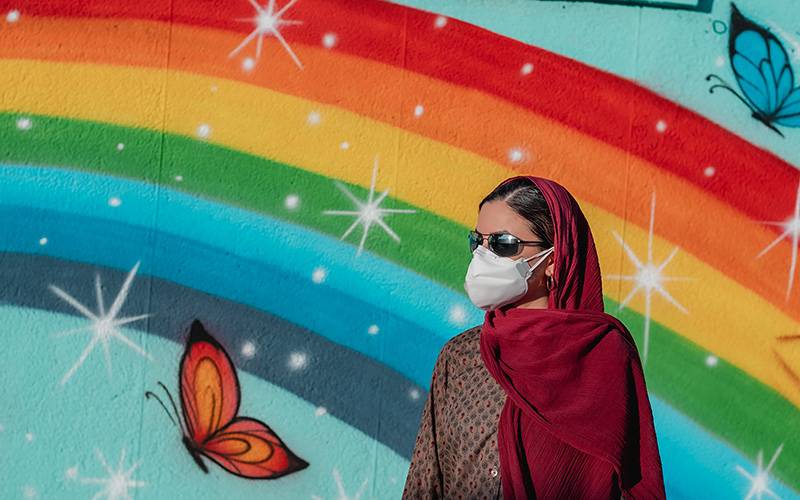This project aimed to explore the impacts of COVID-19 on families in Tower Hamlets.

This project is about everyday life in the midst of a pandemic. We worked with our partners Born in Bradford, a cohort study aiming to reduce health inequalities, to examine the social, economic and health impacts of COVID-19 on family life with young children.
We have also collaborated with members of the International Network on Leave Policies and Research who are studying how parents are managing work, care and home schooling in more than 15 countries. We are interested in the experiences of mothers, fathers and wider kin, and families of all ethnic backgrounds, those in paid work and those not.
Study findings will help support Tower Hamlets council to shape its service offer to all families with young children, especially those newly impoverished and those designated vulnerable: pregnant women, and children.
The project ran from June 2020 to March 2022.
- Background
Impact of COVID-19
Employment, community support and advice, physical and mental health, parenting and family relationships, and family work-care arrangements, are likely to be substantially altered by the current conditions, with consequences for children’s health and development.
Recovery
As we move through the pandemic, local authorities’ management of recovery from COVID-19 requires nuanced data on individuals’ and households’ material and interpersonal strategies to shape deployment of scarce resources. We also wanted to capture new forms of help and support that have emerged within communities during the pandemic.
Inequalities
Inequalities are extreme in Tower Hamlets, making it an exemplar local authority as strategies that are successful in mitigating the adverse impacts of COVID-19 are likely to be transferable to other places with less extreme conditions.
With a fast rising and young population, very high housing density, and around 40 per cent of households living in poverty, families in Tower Hamlets have much to offer in terms of lessons about inequalities in living with the pandemic.
The borough is highly ethnically diverse: about one third of the population is Bangladeshi and over half are from a Black, Asian or Minority Ethnic (BAME) background. There are stark health inequalities: life expectancy, infant mortality, child dental health and obesity all show poorer outcomes compared to London as a whole (Public Health England 2019).
- Aims
This project aimed to:
- understand how families, including those defined as vulnerable, deploy their interpersonal, economic and social resources to manage risks associated with living in lockdown restrictions and its aftermath
- provide new and detailed knowledge to support service delivery in the local authority to promote economic regeneration, social cohesion and address polarised inequalities
- seek evidence of localised adoption and potential of peer, familial and community mutual aid strategies that aid personal and structural recovery pathways as well as identifying need.
- Methodology
- A longitudinal survey of 992 parents of children aged 0-4, and parents to be. The survey ran July-November 2020 and February - April 2021.
- A longitudinal qualitative panel of 22 households sampled from the survey was carried out in January - March 2021 and October-November 2021. Interviews explored the impact of the pandemic on family health, income, relationships, children's lives, wider kin and community in-depth.
- Community Assets Mapping in 2020 mapped the changes to support services available to families, including the emergence of new forms of support (e.g., mutual aid).
This study ran in the neighbouring borough of Newham, which has similar demographic characteristics. Through sharing research tools we will enable Newham to discover the specific impacts of the pandemic on children, families and pregnant women living in the borough.
- Team
Principal Investigator
Co-Investigators
Research Fellows
- Outputs
- Pandemic impacts on Family Lives and Parental Wellbeing: Families in Tower Hamlets survey and panel findings
- Covid-19: The children most likely to benefit from early childhood provision lost out the most
- Income, ethnic diversity and family life in East London during the first wave of the pandemic: An assets approach
- What Family Circumstances, During COVID-19, Impact on Parental Mental Health in an Inner City Community in London?
- The impact of Covid-19 on families, children aged 0-4 and pregnant women in Tower Hamlets: Wave One Survey Findings
- Interim Briefing Report. The First 500: The impact of Covid-19 on families, children aged 0-4 and pregnant women in Tower Hamlets
- Young children's lives during the pandemic: Families in Tower Hamlets survey and panel findings
- Cameron, C., Hauari, H., Hollingworth, K., O'Brien, M., & Whitaker, L. (2022). Access to community services and support through family and friends during the pandemic: Families in Tower Hamlets survey and panel findings.
- Cameron, C., Hauari, H., Hollingworth, K., O'Brien, M., Whitaker, L., & Ucci, M. (2022). Housing and environment for young children during the pandemic: Families in Tower Hamlets community survey and panel findings.
- Cameron, C., Hauari, H., Hollingworth, K., O'Brien, M., & Whitaker, L. (2022). Work, income and food insecurity: Families in Tower Hamlets community survey and panel findings.
- Cameron, C., Hauari, H., Hollingworth, K., O′Brien, M., & Whitaker, L. (2022). Young children's lives in East London through the pandemic: Relationships, activities and social worlds. Children & Society. doi:10.1111/chso.12652
- McIvor, C., Vafai, Y., Kelly, B., O'Toole, S. E., Heys, M., Badrick, E., Dickerson, J. (2022). The Impact of the Pandemic on Mental Health in Ethnically Diverse Mothers: Findings from the Born in Bradford, Tower Hamlets and Newham COVID-19 Research Programmes. International Journal of Environmental Research and Public Health, 19 (21), 14316.
 Close
Close

